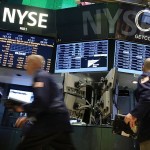British low-cost airline easyJet Plc swung to a profit in the first fiscal half for the first time since 2002 but shares of the company tumbled as it warned of the negative impact a French strike in April would have on full-year performance.
Europes second-biggest budget airline reported that total revenue for the six months ended March 31st rose 3.8% to £1.767 billion from a year earlier, with total revenue per seat jumping by an annualized 2.6% on a constant currency basis. The company generated a net profit of £5 million for the period, compared to a £41-million loss last year.
The more closely watched pre-tax profit was £7 million, compared to a £53-million loss last year, falling in the upper end of the airlines forecast for between a loss of £5 million and a profit of £10 million.
Cost per seat excluding fuel increased by 2.9% on a constant currency basis, affected by an expected increase in charges at airports in Germany and Italy and increased disruption costs.
Average load factors, a gauge of how full the companys aircraft are, rose 0.7% to 89.7%, while capacity increased by 3.6% to 32.2 million seats.
Carolyn McCall, easyJet Chief Executive said: “easyJet has delivered a record performance in the first half of the year by continuing to deliver its strategy of making travel easy and affordable for passengers. The profit in the half reflects the delivery of our customer focused revenue initiatives and a strong finish to the ski season as well as the benefit we received from the lower fuel price and favourable foreign exchange movements.”
However, easyJet warned difficult months lie ahead and said it will pack more seats to lower unit costs. As of May 2016, all future deliveries of A320 planes will have 186 seats and the entire existing A320 180-seat fleet will be equipped with extra seats starting in winter 2016, expected to bring cost-per-seat saving of 2%.
The budget airline warned that the extended French air traffic control strikes in April, which led to the cancellation of 600 flights, will result in a £25-million reduction to annual profit. The disruption, coupled with the timing of Easter, would cause a 3% drop in revenue per seat, easyJet said, with fiscal second-half revenue per seat at constant currency basis projected to decline by low single digit percentage points.
However, some analysts saw the steep stock drop as excessive. The company said it was confident its fares would be competitive against rivals, particularly Europes number one budget airline Ryanair, as it lowered them to reflect the lower oil price. Fuel costs for the full fiscal year ended September 2015 will likely be £95 – £120 million less than in FY 2014, easyJet said, although currency movements will have a £20-million adverse effect.
The company still expects full-year revenue and profit to grow and deliver “sustainable” returns to shareholders. On March 20th 2015, easyJet paid a dividend of 45.4 pence per ordinary share in respect of FY 2014, up 35.5% from a year earlier, or a total of £180 million.
“As we enter the important summer season forward bookings are in line with last year and as we predicted passengers are benefitting as fares fall to reflect a more competitive operating environment and lower fuel costs,” said Carolyn McCall.
Shares of easyJet Plc fell 7.31% to GBX 1 699 by 08:47 GMT on Tuesday in London, marking a one-year drop of 1.79%. The company is valued at £7.28 billion. According to the Financial Times, the 21 analysts offering 12-month price targets for easyJet Plc have a median target of GBX 1 950, with a high estimate of GBX 2 365 and a low estimate of GBX 1 500. The median estimate represents a 6.38% increase from the previous close of GBX 1 833.





